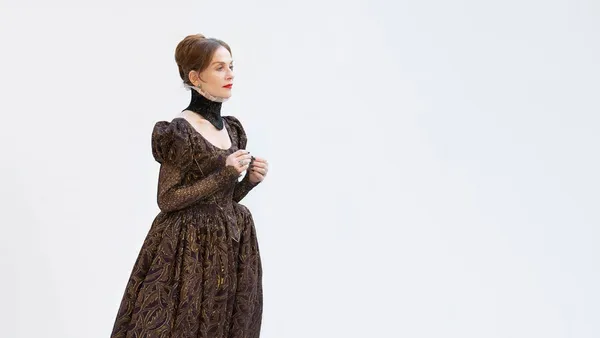 |
| Isabelle Huppert as Marie Stuart in Robert Wilson's production of Mary Said What She Said to be presented at the Edinburgh Fringe Festival in August Photo: Théâtre de la Ville Paris |
Isabelle Huppert admits she has an obsession with Mary Stuart, the Queen of Scotland and France who lost her crown because of her passions.
She has already played her on stage in London at the National Theatre in a 1996 production (directed by Howard Davies) of Schiller’s play, opposite Anna Massey as the Protestant Elizabeth of England.
One review said that Huppert “devoured the stage with the animal vigour of a refined thoroughbred.”
At the Rendezvous with French Cinema in Paris, Huppert, who was there primarily to talk about her role as a woman facing up to death in Ira Sachs’s film Frankie, revealed that she will bring Mary back to Scotland as part of the Edinburgh Festival Fringe in August, where she will perform in the city for the first time.
 |
| Isabelle Huppert plays a dying woman in Ira Sachs’ film Frankie Photo: Richard Mowe |
The production of Mary Said What She Said, set to music by Ludovico Einaudi, is by a longtime collaborator, Robert Wilson. She appeared in it last year at the Théâtre de la Ville in Paris.
“I am very excited and a little bit scared to be bringing it to Scotland,” said Huppert, who knows the country well from family visits over the years to follow in the wake of her heroine. “And yes I suppose I am a bit obsessed with Mary Stuart,” she admits with a toss of her natural red flecked locks.
Wilson’s production joins the Queen on the day before her execution.
The playwright Darryl Pinckney has said of his monologue in three parts: “Mary is a woman who fought the forces of history to control her destiny. The day before her execution, she is still fighting. She fights while she seeks the voice to call on Divine justice. She writes history. There was her childhood at the French court.
“Afterwards, an early widowhood put an end to her dance. She remembers. She was back in Scotland.
“Braving captivity was her nature. She wanted a strong man. That was the beginning. She married, had a son and murder occurred. Nothing is the same anymore, life follows a new rhythm. Catholics, Protestants, Mary, Elizabeth, Love, Death. Escaping was her destiny and that is how her reign came to an end. She did not try to save her life. She tried to perpetuate herself. On her last morning, Mary, Queen of Scotland, was dressed in red.”
Wilson previously worked with Huppert on Orlando and the new production marked “a grand reunion” according to Huppert.
In Sachs’ film, due for a UK release later in the year, Huppert plays an actress bringing together her loved ones before she dies, set against the sumptuous Portuguese landscapes of Sintra.
Huppert felt an empathy with Sachs’ cinema. “The first of his films I saw was Love Is Strange, which I really liked. Then I saw Brooklyn Village. Our meeting was sort of sparked by me, somehow or other, two years ago in New York. A meeting preceded by exchanges and letters. Then Ira wrote Frankie with me in mind.
“Frankie knows she is seriously ill and decides to spend her final vacation surrounded by her loved ones, but it's hard to gauge to what extent the disease and death are ‘at work.’ Frankie recounts the inability to express feelings that strikes when someone is going to die. At some point, one runs up against the impossibility of saying anything, of talking about it.”
Huppert seems to specialise in playing strong women. Michael Haneke who directed her in The Piano Teacher, has described her simply as “the best actress I know in Europe, if not the entire world. She has, on the one hand, the sensitivity and ability to show suffering, on the other, a character’s cold bloodedness.”
In an earlier interview for Schiller’s play at the National she confessed to me an affinity for certain aspects of the British way of life and was attracted to being part of the great tradition of English theatre, which she holds in some awe.
"My mother taught English so there was always this English sensibility, and as a child I came a lot to England, Scotland and Ireland. Most French people find your country very exotic - maybe because you remain attached to certain traditions more than we do in France.
“There is a sense of the past which is much stronger and somehow you're more relaxed."
Huppert has always regarded her creations as people rather than characters. “A character is always limited as an invention or a fiction and I want to play them as real people, and not allow acting to get in the way, which involves a rigorous pruning back to the truth all the time,” she says. She was also seen on screen at the Rendezvous in La Daronne by Jean-Paul Salomé, in she becomes an almost accidental drug baron - and speaks Arabic.
She admits to working from the inside out, drawing on parts of herself but always preserving a personal arena to which she can retreat. “If you don't keep a space then it could stop being acting and border on la folie - insanity.
“So you have to tread very cautiously. With the kind of roles I tackle I have a heightened sense of awareness of how dangerous it could be if all of a sudden you began to believe that what you play is your life.”
She always researches her subjects with an obsessive thoroughness which makes her prodigious output all the more impressive. She suggests that she “devours” roles with an all-consuming passion.
Huppert is a mother as well as an actress, and has managed to raise three children while working. And, no, she has no desire to take it easy now that she is in her sixties. "I like being an actress. As long as I have the opportunity of being one, I'll take it."





















